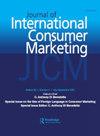Advanced Introduction to Marketing Strategy
IF 2.8
Q3 BUSINESS
引用次数: 0
Abstract
The above quote from Peter Drucker reminds us of the central role of the customer in any marketing strategy, and the need to understand not just the customer’s changing needs, but also changes in the environmental context, to offer superior customer value and achieve competitive advantage. Traditional methods of developing marketing strategies may be less suitable in highly turbulent industries or in embryonic markets where customers’ needs are difficult to pin down. The recent pandemic has only heightened uncertainty and turbulence faced by marketing decision makers. In recent years we have seen an emergence of an outside-in approach for marketing strategy development, which increases a firm’s ability to anticipate and react to customer changes due to constant environmental scanning and sensing (Day 2014). This volume, by Prof. George S. Day of the Wharton School, University of Pennsylvania, is a visionary rethinking of marketing strategy for today’s turbulent environment, stressing the need for managers to consider the outside-in approach for value creation and marketing strategy formulation. In Chapter 1, Prof. Day develops a definition of marketing strategy, and outlines the benefits of taking a marketing strategic approach, centered on customer orientation and sustaining superior customer value. This definition is then transformed into four guiding premises, or marketing strategy building blocks, which become the outline for the rest of the book. These are:营销策略高级导论
彼得·德鲁克的上述名言提醒我们,客户在任何营销策略中都扮演着核心角色,不仅需要了解客户不断变化的需求,还需要了解环境环境的变化,以提供卓越的客户价值并获得竞争优势。制定营销策略的传统方法可能不太适合高度动荡的行业或难以确定客户需求的萌芽市场。最近的疫情只会加剧营销决策者面临的不确定性和动荡。近年来,我们看到了一种由外而外的营销战略制定方法的出现,这种方法提高了公司预测和应对客户变化的能力,这是由于不断的环境扫描和感知(2014年第1天)。这本书由宾夕法尼亚大学沃顿商学院的George S.Day教授撰写,是对当今动荡环境下营销战略的一次富有远见的重新思考,强调了管理者在价值创造和营销战略制定时需要考虑外部因素。在第一章中,戴教授提出了营销战略的定义,并概述了采取以客户为中心的营销战略方法和保持卓越客户价值的好处。然后,这一定义被转化为四个指导前提,或营销战略构建块,成为本书其余部分的大纲。这些是:
本文章由计算机程序翻译,如有差异,请以英文原文为准。
求助全文
约1分钟内获得全文
求助全文
来源期刊
CiteScore
7.60
自引率
6.10%
发文量
29
期刊介绍:
The Journal of International Consumer Marketing examines consumer and organizational buyer behavior on a cross-cultural/national and global scale combining up-to-date research with practical applications to help you develop an action plan for successful marketing strategy development. Business professionals, policymakers, and academics share insights and "inside" information on a wide range of cross-cultural marketing issues, including international business customs, negotiating styles, consumer brand loyalty, price sensitivity, purchasing and leasing, consumer satisfaction (and dissatisfaction), and advertising.

 求助内容:
求助内容: 应助结果提醒方式:
应助结果提醒方式:


